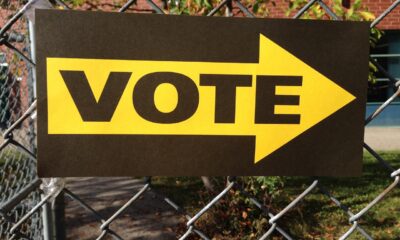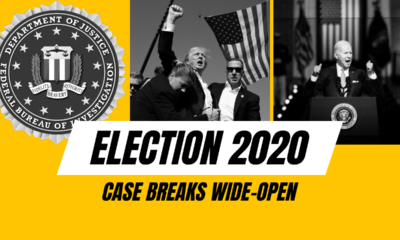Guest Columns
Dems and GOP Manipulating Third Parties Again. Here’s How To Stop It.

Democracy may be on the ballot this fall, but meanwhile, both Democrats and Republicans are working hard to game the electoral system and weaponize choice against voters.
History of boosts of some minor candidates and attempts to de-list others
In the past week, Republicans got caught trying to boost lefty professor Cornel West in battleground North Carolina, while Democrats tried to knock Robert F. Kennedy Jr. off the ballot in his home state of New York.
The calculated manipulation of third parties and independents is a timeworn problem. Democrats have long looked to elevate Libertarians while the GOP often hoists the Green Party. These efforts are cynical but make all the sense in the world if they siphon votes from your strongest opponent.
Yet, a voter-friendly solution has never been clearer. Ranked choice voting puts an end to anti-voter gamesmanship and ensures a winner with more than 50% of the vote. It’s the proven and popular tool that guarantees voters have real choice and that majorities still rule.
Two states, Maine and Alaska, will use RCV for president this November. In many others, the chicanery continues apace.
Democrats and Super PACs closely connected to President Biden have challenged the validity of Kennedy’s signatures and aggressively sought to prevent him from making the ballot across the nation – recently even accusing him of lying about his New York residency. Republicans just got caught boosting West in North Carolina by essentially running a petition drive for a campaign that admits it’s out of cash.
Ranked choice voting would change the game
If these efforts feel more intense this year, it’s because no independent has run as strongly as Kennedy since Ross Perot in 1992 – and because a handful of votes in a handful of states could tip the presidency. Think of the winning 2020 margins: 11,779 votes in Georgia, 10,457 in Arizona, and 20,682 in Wisconsin.
RCV would change all these calculations. In an RCV election, voters have the option to rank their choices in order, for example, Kennedy first and Biden second, or Libertarian candidate Chase Oliver first and Donald Trump second. If anyone wins 50% of the vote right away, they win, like any other election.
But if everyone falls short, the last-place candidates are dropped – instead of playing spoiler. If your candidate is still in the race, your vote stays with them. And if your candidate is eliminated, the second choice comes into play. The final tally is effectively an “instant runoff” between the strongest two candidates, creating the most representative outcome possible.
It’s the ultimate win-win for voters and for parties – all the benefits of choice, with the added assurance that the candidate with the widest support and majority appeal wins. We can stop the quadrennial hand-wringing about the spoiler effect, cease shaming third-party voters, and start working to persuade them.
Alleged dissatisfaction with the majors
Polls show record dissatisfaction with the two parties, their nominees, and the entire prospect of a 2020 rematch. Voters are making their frustrations clear. Third-party candidates are not going away. We can adjust to the reality that there will always be another Perot, or Ralph Nader, or Jill Stein, or Gary Johnson, or RFK, or West.
Or we can dig in our heels and keep repeating this tired debate. At a time when the nation feels ever more polarized, we can risk a president elected without a majority in the decisive states – leaving us even more divided than we are now.
Our politics are messy, and our opinions can be complicated. There’s no silver bullet to everything that ails our civic spirit. Yet the road out of this toxicity and sourness might begin with embracing national values that most of us still hold dear: More individual choice is good, all of us should be heard, and majorities must rule.
Ranked choice voting makes that possible. This presidential campaign would have an entirely different – and vastly more hopeful – feel if every state followed Maine and Alaska’s lead and adopted it.
Editor’s Note
As ever, the views expressed by any contributor or guest author are that author’s own and do not necessarily reflect those of CNAV. CNAV published this essay to give the foremost proponents of ranked choice voting a chance to make their case. Nevertheless CNAV considers the case weak and observes that the author has not shown how ranked choice voting would disincentivize the “manipulation” of which he complains. Nor did he consider the spiteful motives of Nick Begich, who instructed his supporters to vote for Mary Peltola as their second choice, just to spite the higher-ranking Republican, Sarah Palin. In CNAV’s opinion, ranked choice voting favors spiteful candidates and especially long-established political dynasties like Alaska’s Begiches and Murkowskis.
This article was originally published by RealClearPolitics and made available via RealClearWire.
David Daley is a senior fellow for FairVote, the author of "Ratf**ked: Why Your Vote Doesn’t Count."
-

 Accountability3 days ago
Accountability3 days agoWaste of the Day: Principal Bought Lobster with School Funds
-

 Executive1 day ago
Executive1 day agoHow Relaxed COVID-Era Rules Fueled Minnesota’s Biggest Scam
-

 Civilization11 hours ago
Civilization11 hours agoWhy Europe Shouldn’t Be Upset at Trump’s Venezuelan Actions
-

 Constitution2 days ago
Constitution2 days agoTrump, Canada, and the Constitutional Problem Beneath the Bridge
-

 Civilization1 day ago
Civilization1 day agoThe End of Purple States and Competitive Districts
-

 Christianity Today10 hours ago
Christianity Today10 hours agoSurprising Revival: Gen Z Men & Highly Educated Lead Return to Religion
-

 Civilization5 days ago
Civilization5 days agoThe devil is in the details
-

 Executive23 hours ago
Executive23 hours agoWaste of the Day: Can You Hear Me Now?










